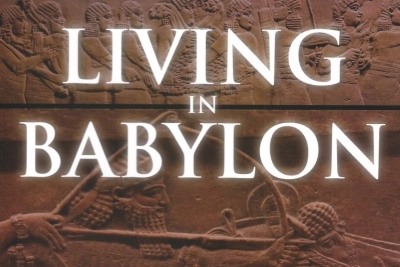What we know as modern Judaism was not born in Israel or in Jerusalem – it was born in Babylon. It was formed during the exile of some 10,000 people from Jerusalem and the surrounding villages after the surrender of Jerusalem to the Babylonians in 597 BC.
Nebuchadnezzar wanted labour to dig canals and construct an irrigation system around the River Euphrates to compensate for a severe drought. This is why he took so many people on a forced march of a thousand miles and gave them land on which they could build houses and form a cluster of villages, which enabled them to maintain their Hebrew identity.
Jewish National Identity
That Hebrew identity was based upon a corporate understanding of the nation being in a covenant relationship with God – the God who had revealed himself to the national patriarchs, Abraham, Isaac and Jacob. The corporate nature of the nation was reinforced by its family and tribal structure. If one member of a family severely offended, the whole family was held responsible, as in the case of Achan (Josh 7).
That corporate identity was reinforced by Israel’s religious practices, which centred upon the Temple in Jerusalem where the priests daily said prayers on behalf of the nation. The most important event was the annual ‘Day of Atonement’ when the priests were responsible for an act of atonement on behalf of the whole nation. This ensured the forgiveness of sins, thereby maintaining the covenant relationship between the nation and God.
When the Temple was destroyed in 586 BC, some 10 years after the exile had begun, this was a devastating blow to those living in Babylon. They had to find some other way of dealing with their sins and ensuring that they were in a right relationship with God. It was at this point that Ezekiel stepped forward and almost single-handedly saved the people of Israel from extinction.
When the Temple was destroyed, the Jews had to find some other way of dealing with their sins and ensuring that they were in a right relationship with God.
Ezekiel’s Role
All the exiles would have known that King Zedekiah had revolted against Babylon in a conspiracy with other neighbouring nations. They would certainly have known when the Babylonian army set off to put down the rebellion, because some of the men of Judah were serving in the Babylonian army as skilled archery instructors, which was the deal allowing them land on which to build their houses and establish their community life.
The exiles all knew how long it would take the Babylonian army to march to Jerusalem. Ezekiel notes the day, saying: “In the ninth year [of the exile], in the tenth month on the tenth day, the word of the Lord came to me; son of man, record this date, this very date because the king of Babylon has laid siege to Jerusalem this very day” (Ezek 24:1). Ezekiel began a fast of words from that day; he never spoke again in public until the day news arrived that Jerusalem and the Temple had been destroyed.
From that day Ezekiel led the nation, not in mourning and lamentation (although his own wife had died on the same day), but in celebrating the new basis of the Hebrew religion. Ezekiel recognised that God had fulfilled his word, acting in justice, because of the gross sinfulness of the people and their leaders, including the priests in the Temple who were heavily into idolatry.
Ezekiel declared that from that day on, everyone was to be responsible for their own sins.
Trusting in God
Ezekiel declared that from that day on, everyone was to be responsible for their own sins (Ezek 18): each individual had to seek God for forgiveness of their sins, no longer relying upon animal sacrifice and rituals performed by priests in the Temple. The practice was established of saying prayers in the home and strict observance of the Sabbath, beginning with lighting a lamp on the Sabbath evening, the whole family gathering around the table for a meal prefaced by a reading from the Pentateuch or the recitation of the Shema and prayers.
On that day, the people of Israel no longer put their trust in the institution of the Temple, the priesthood, and the rituals of animal sacrifice; they put their trust in the Lord. Judaism was born in Babylon on that day.
Could it be – with all the churches closed in the Western nations by the pandemic for the first time in centuries – that God is saying something very special to Christians today? Has God kicked away the human props on which we rely? Is he telling us to put our trust in him – and in him alone?
This article is part of a series. Click here for previous instalments.
